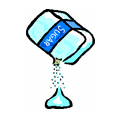It’s no secret that people are consuming a lot more sugar than even twenty years ago. Do you need to worry about the amounts of sugar you are eating? Let’s look at a few comparisons.
- Twenty years ago, the average person consumed 109 pounds per year. The current estimated consumption is 135 pounds per year – an increase of 26 pounds!
- At the turn of the century, the average consumption was only 5 pounds per year. At that time, cancer and cardiovascular disease were almost non-existent.
Is all sugar bad?
No. Sugar is needed by your body to function. Complex sugars (sugars that are absorbed slower than simple sugars) are a healthy source of sugar. Below are some examples of foods that contain healthy sugar:
- fruits
- vegetables
- legumes such as beans
- nuts
- whole grain foods such as whole wheat bread
What are simple sugars?
Simple sugars are sugar that is rapidly absorbed into the bloodstream. Examples of simple sugars are glucose, fructose, and sucrose which are found in foods such as cakes, cookies, cereals, ice cream, fruit drinks, and candy. Simple sugars, unlike complex sugars, are rapidly absorbed into the bloodstream. This quick spike in blood sugar also causes a rapid drop in blood sugar as the effects of the sugar wear off, causing fatigue and drowsiness.
Hidden sugars
You are probably eating a lot more sugar than you realize! Sugar is added to many processed foods, and in some cases a LOT of sugar is added. You can find added sugar in foods such as cereals, peanut butter, ketchup, microwave meals, etc. If your diet contains a lot of processed foods, you can safely say that you are consuming more sugar than your body needs.
Below are a few examples of the amount of sugar in common foods and drinks.
| Food/Drink | Grams of sugar | Equivalent teaspoons of sugar |
| 20 ounce bottle Coke | 65 grams sugar | 15 teaspoons sugar |
| Dunkin donuts apple crumb donut | 49 grams sugar | 11.5 teaspoons sugar |
| Starbucks white chocolate mocha | 61 grams sugar | 14.5 teaspoons sugar |
| McDonalds medium orange juice | 39 grams sugar | 9 teaspoons sugar |
| Krispy Kreme strawberry shake | 119 grams sugar | 28 teaspoons sugar |
Why is excess sugar bad for you?
While we all know that an excess of sugar can lead to diabetes, we do not need to be diabetic to feel the effects of too much sugar.
Below are some of the ways that simple sugars affect your body’s health:
- Lead to mood swings
- Aggravate personality disorders
- Increase heart disease, hypertension
- Increase degenerative disease
- Reduce HDL (good cholesterol) and increase LDL (bad cholesterol)
- Contribute to obesity
- Increase fat in the liver
Perhaps one of the most compelling reasons to moderate sugar intake is that sugar is known to “feed” cancers. Cancer cells use glucose to grow and multiply. By limiting your sugar intake, you reduce your chances of getting cancer, and if you have cancer, you reduce the chances of the cancer multiplying.
How can you reduce sugar?
There are many hidden sugars lurking in your pantry! Start reading the labels. If the food has a type of sugar (such as fructose, sucrose, cane sugar, dextrin, molasses, etc.) as one of the first three ingredients, you should look for a healthier version that has less sugar.
Below are a few simple strategies for reducing sugar in your diet:
- When baking, reduce the amount of sugar in the recipe by up to 1/3. You will be surprised that cakes, muffins, and cookies can still taste good with less sugar!
- Substitute applesauce for some of the sugar when baking. The applesauce also helps to make cakes and muffins moist, allowing you to also reduce the amount of fat in your baking.
- Use fruit jams with no added sugar on your pancakes and waffles instead of syrup.
- If you enjoy drinking fruit juice, choose only 100% fruit juice, and limit to no more than one cup per day.
- Choose a cereal with less than 5 grams of simple sugar per serving.
- Avoid drinking sodas – they contain empty calories that are rapidly absorbed in the bloodstream.

